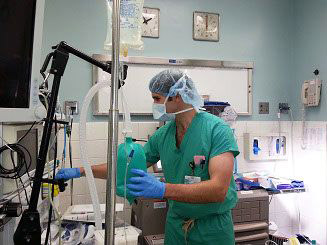Anesthesiologists are highly trained physicians who specialize in the field of anesthesiology. After earning a bachelor's degree, typically with a strong foundation in subjects like physics, chemistry, biology, and mathematics, they complete four years of medical school to obtain their medical doctorate. Following medical school, they undergo an additional four years of specialized training, which includes one year of internship and three years in an anesthesiology residency program.
Once fully trained, anesthesiologists have a wide range of career options. They may work in hospitals, surgical centers, outpatient clinics, or pain management facilities. Their primary responsibilities include administering anesthesia during surgeries, managing patient pain, and monitoring vital signs to ensure patient safety before, during, and after medical procedures. Some anesthesiologists may also specialize in fields like critical care, pain medicine, pediatric anesthesia, or obstetric anesthesia, providing tailored care to patients in specific situations.
In addition to clinical work, anesthesiologists may pursue careers in research, teaching, or administration within academic or healthcare institutions. These diverse opportunities allow anesthesiologists to impact patient care, education, and advancements in medical practice.
Here are some links that may assist a student in understanding what it takes to get into medical school and anesthesiology residency:
